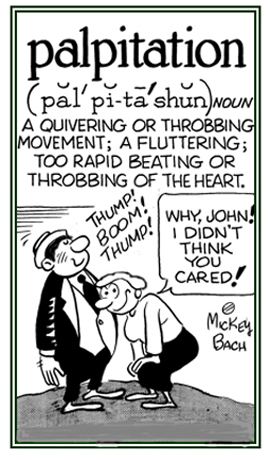palp-, palpo-, palpi-
(Latin: to touch gently, to stroke; to pat)
A device for measuring pressure-induced degrees of pain: Carol's doctor used a palpatometer to find out just how much discomfort and soreness she was feeling in parts of her body.
A method of measuring the degree of pressure which does not produce pain: The doctor decided to use palpatometry on Susan’s arm to determine if she had normal feelings or if a bone was broken.
Finger touching in which the resistance of the tissues under the finger as well as the sound that comes from the area are used in aiding certain forms of medical diagnoses: The doctor used palpatopercussions by tapping on Joe’s chest, back, and abdomen during the general health check-up to determine if he was healthy enough to climb in the Alps during the summer.
Someone who examines, or those who explore, by touching an organ or an area of a body; usually, for diagnostic reasons: As palpators, the blind men were trying to identify the various parts of the elephant's body and this illustration shows where each one is feeling in order to determine what he thinks the creature is like.
Go to this Blind Men and the Elephant page so you can see the results of their "palpations".


The direct striking or tapping of the surface of a part of the body with the purpose of obtaining diagnostically relevant information by tactile or touching rather than with auditory procedures: Dr. Anderson used palpatory percussions, or finger touching, by hitting lightly on the outer layer of Jack’s stomach to hear if there were any indications of an abnormal condition.
palpitant (adjective), more palpitant, most palpitant
A shaking and trembling: Mike had a palpitant reaction when he was testifying in court about his friend's driving when she was drunk.
palpitate (noun), palpitates; palpitated; palpitating
1. To move with a slight tremulous motion; to tremble, to shake, or to quiver: Jim's heart started to palpitate when it was announced that he was the winner of the TV quiz program.
2. To beat with excessive rapidity; to throb: Ted's heart was palpitating and causing him to become dizzy when his doctor told him that he needed an operation for his hernia.
3. Etymology: borrowed from Latin palpitatum, past participle of palpitare, "to throb or to flutter"; a form of palpare, "to touch gently, to stroke".
2. To beat with excessive rapidity; to throb: Ted's heart was palpitating and causing him to become dizzy when his doctor told him that he needed an operation for his hernia.
3. Etymology: borrowed from Latin palpitatum, past participle of palpitare, "to throb or to flutter"; a form of palpare, "to touch gently, to stroke".
palpitating (adjective), more palpitating, most palpitating
Conveying movements with a slight tremulous motions or shaking and quivering: When Shirley touched Brian's arm, he suddenly felt uncontrollable palpitating sensations.
Patrick felt his palpitating heart throbbing after climbing all of those stairs to the top floor of the tall building.
1. A person's own sensation of irregular or accelerated heartbeats: Joan was under so much stress that she developed and felt palpitations in her chest.

© ALL rights are reserved.
Go to this Word A Day Revisited Index
A palpitation is usually felt after a strenuous exercise, in tense situations, or after a severe scare, when the heart is beating harder and/or faster than normal.
2. Etymology: from Latin palpitationem, from palpetare, "to throb, or to flutter".
Go to this Word A Day Revisited Index
so you can see more of Mickey Bach's cartoons.
1. In some hydroids (freshwater coelenterates or invertebrates; such as, jellyfish), a filamentous tactile or touching process: Such palpocils, or sensory filaments, can be detected on sea anemones and corals.
2. A minute soft filamentary process springing from the surface of certain hydroids and sponges: The palpocils are tactile hairs appearing on coelenterates, which are animals with a saclike body with only one opening and tentacles with stinging parts, and occur in medusa and polyp forms.
2. A minute soft filamentary process springing from the surface of certain hydroids and sponges: The palpocils are tactile hairs appearing on coelenterates, which are animals with a saclike body with only one opening and tentacles with stinging parts, and occur in medusa and polyp forms.
1. One of two tactile attachments that protrude from the mouthparts of insects, crustaceans, arachnids, and annelids (wormlike creatures; such as, earth worms, etc.): A good example of palpi, which are used for touching or tasting, can be seen by looking closely at the side of a grasshopper’s oral cavity or mouth.
2. Etymology: from Latin palpare, "to stroke, to caress".
2. Etymology: from Latin palpare, "to stroke, to caress".
The act of feeling someone's pulse: Alfred's physician used a sphygmopalpation as a routine part of the medical examination.
A clinical observation of the body temperature by feeling with the hands during a medical examination: When Dr. Smith shook hands with his patient, he noticed that her thermopalpation was very cold!
Showing page 2 out of 2 pages of 28 main-word entries or main-word-entry groups.

